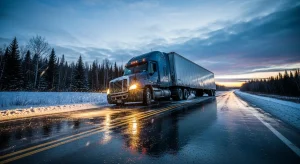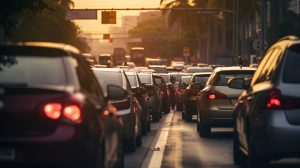The safety of American highways is no longer just about pavement quality, visible signage, or driver discipline. In today’s digital age, cybersecurity has become a critical factor in protecting the systems that support transportation.
A recent U.S. Department of Transportation (DOT) warning has raised alarms across the industry: solar-powered highway equipment may contain hidden cellular radios, posing risks of espionage, data manipulation, and threats to the safe operation of America’s roads.
Where Were the Devices Found?
According to the DOT’s Federal Highway Administration, the suspect components may be embedded in various types of roadside infrastructure, including:
- Highway weather stations, which provide critical data on snow, storms, and visibility.
- Digital signage systems, which guide truckers and motorists through detours, lane closures, and traffic conditions.
- Electric vehicle (EV) chargers on interstates, an increasingly common part of the highway network.
Investigations revealed that certain imported inverters and battery management systems contained undocumented cellular radios. These devices could transmit data secretly, without the knowledge of state or local operators.
Risks for Truck Drivers
For professional truckers, who rely on this infrastructure every day, the implications are serious:
- False or manipulated data: Compromised weather stations could send incorrect road condition reports, influencing driving decisions and putting lives at risk.
- Tampered signage: Digital boards showing lane closures or detours could be altered, causing traffic chaos or even accidents.
- Interference at EV chargers: As heavy-duty fleets move toward electrification, sabotage at charging stations could create large-scale logistical problems.
Cyber-espionage: The location and movement of fleets could be tracked without authorization, jeopardizing cargo security and company operations.
An International Challenge
The geopolitical angle cannot be ignored. Much of the solar infrastructure deployed in the U.S. comes from foreign suppliers, particularly China. Washington has repeatedly voiced concerns about the potential for “backdoors” in imported technology that could enable surveillance or remote control.
This is not the first time a critical sector has faced this dilemma. Similar concerns led to restrictions on telecom giants Huawei and ZTE. Now, the same scrutiny has shifted to transportation and energy infrastructure, sectors directly tied to daily life and the strategic logistics backbone of the American economy.
DOT’s Response
The Department of Transportation has directed state and local operators to take immediate action:
- Inspect existing solar-powered highway equipment.
- Scan batteries, inverters, and energy management systems for hidden radios.
- Suspend or remove suspect components until their safety can be verified.
The goal is to prevent unauthorized transmissions that could compromise the integrity of highway systems.
What It Means for the Trucking Industry
For truck drivers and freight companies, this development highlights a new reality: the highways of tomorrow are built not only with concrete and steel but also with connected technology. While this connectivity brings advantages, it also introduces risks that must be managed.
“Highway cyber-espionage” is a new term, but it’s already making its way into logistics discussions. Just as fleets are protected against cargo theft, they may soon need safeguards against digital threats in roadside infrastructure.
This situation also raises tough questions about trust in international suppliers. Should the U.S. manufacture its own solar infrastructure for highways? How can agencies audit thousands of miles of already-installed equipment?
A Red Flag for Truckers
Although it may seem like a technical issue, the DOT’s warning is directly relevant to those who keep America’s freight moving. Manipulation of highway systems could have consequences as serious as a crumbling bridge or a poorly maintained road.
For truckers, awareness is the first line of defense:
- Stay alert to road signs that don’t match real conditions.
- Report anomalies in digital stations or signage.
- Push for state agencies to guarantee the safety of connected infrastructure.
The U.S. freight system is too vital to be exposed to invisible risks. The challenge is no longer just keeping roads free of potholes—it’s keeping them free of hidden radios.

Frozen Roads After Bomb Cyclone: Black Ice, Record Snow and High Risk for Trucks
Frozen roads continue to disrupt freight transportation following the impact of a powerful bomb cyclone, leaving behind black ice, highway shutdowns, power outages, and dangerous winter driving conditions stretching from the Gulf Coast to New England.

Lunar New Year 2026: Ancient Traditions, Renewed Energy, and Massive Celebrations
Lunar New Year 2026 begins on February 17 under the sign of the Fire Horse and is marked by spiritual rituals, family reunions, and large-scale celebrations in both China and the United States, especially in California.

Freedom 250 Grand Prix: How Logistics and Transportation Will Power the Race in Washington
The first-ever IndyCar street race in Washington, D.C., scheduled for August 21–23, will headline the United States’ 250th anniversary celebrations — and it will trigger a massive transportation, freight, and urban logistics operation behind the scenes.

Groundhog Day: What It Means for Trucking When “Phil Sees His Shadow”
The forecast from America’s most famous groundhog is calling for more winter — and that’s an important signal for the trucking industry and cold-season route planning

Love on the open road: the best dating apps for truckers
If you’re looking for someone to go the long haul with, here are the best dating apps for truck drivers. They say love is everywhere…

The most congested cities in the U.S. and the world in 2025
The annual TomTom Traffic Index produces a ranking of the most congested cities in the world. The annual TomTom Traffic Index presents an analysis of
